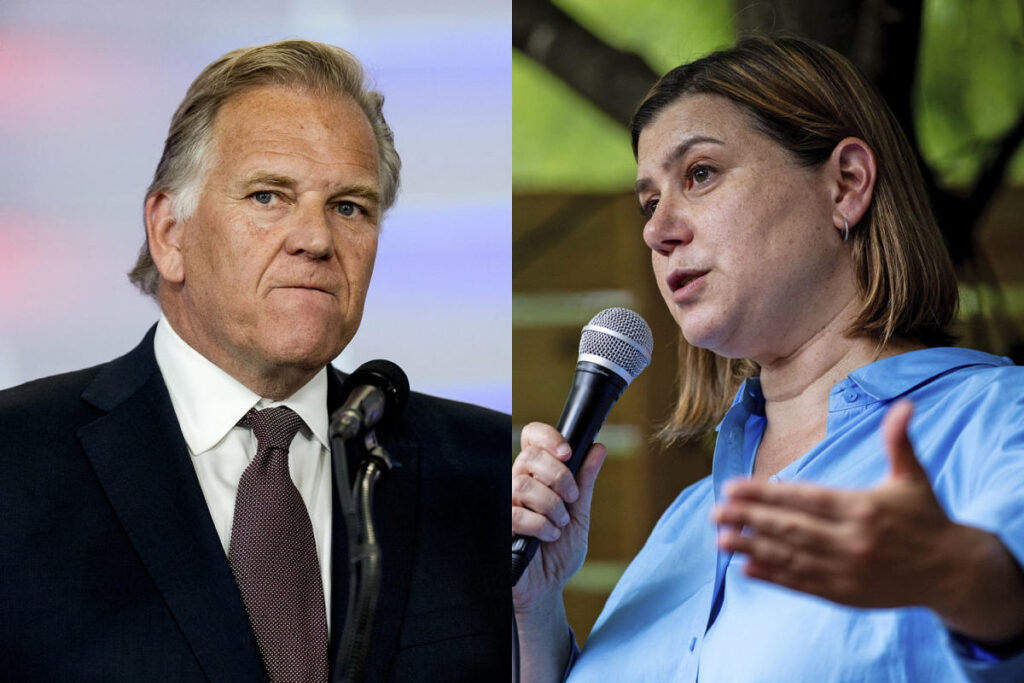The Michigan Senate race, positioned as critical for both chamber control and the presidential election outcome, features two prominent candidates: former GOP Rep. Mike Rogers and Democratic Rep. Elissa Slotkin. Both candidates are closely aligning themselves with their respective party leaders. Rogers praised former President Donald Trump for his readiness to influence Michigan’s recovery, emphasizing Trump’s potential to shift the state’s direction. In contrast, Slotkin highlighted Vice President Kamala Harris as a game-changer for voter engagement, which saw a noticeable uptick following her elevation in the party. Despite these advantages, Slotkin cautioned that the race remains competitive, particularly among independent voters who are still undecided. She noted that the battle centers on a small group of swing voters, illustrating the tight contest ahead as the election draws near.
Both candidates not only bring political experience but also a rich background in national security. Slotkin has served as a CIA analyst and worked in the Defense Department, while Rogers has experience as an FBI agent and chair of the House Intelligence Committee. Their campaigns differ significantly in their approaches to issues like U.S.-China relations, Middle Eastern conflicts, and Russia’s actions in Ukraine. Slotkin, who has a background as the only Jewish member of Michigan’s congressional delegation, has faced challenges in addressing the sensitivities within the state’s diverse communities. Her efforts to maintain dialogue with both Jewish and Arab constituents reflect the complex dynamics of the race. In contrast, Rogers criticized Slotkin for her perceived inconsistency, arguing that her efforts to appeal across communities could lead to dissatisfaction on both sides.
The candidates also share diverging perspectives on domestic policies, particularly regarding electric vehicles. While Rogers advocates for market-driven solutions and is wary of emissions mandates, Slotkin has recently asserted that she stands against such impositions while still addressing the need for evolving the auto industry. This conversation is critical in Michigan, a state deeply intertwined with automotive history. Slotkin’s nuanced stance on environmental regulations has emerged as a focal point of her campaign, particularly as she positions herself as pragmatic in her approach to electric vehicle policies, assuring voters that she does not advocate for unrealistic standards.
Abortion rights have become a potent issue in this election cycle, especially after recent developments that have energized Democratic voter turnout. Slotkin, positioning herself as a fierce advocate for abortion rights, has highlighted the previous legislative successes in codifying reproductive rights in Michigan. She argues that the federal landscape needs proactive reinforcement to restore these rights nationally, reflecting her commitment to continue fighting for reproductive health access. Conversely, Rogers has suggested he respects the state’s decision regarding abortion rights, attempting to present himself as aligned with Michigan voters’ sentiments despite a historic voting record that has supported restrictions on the procedure.
As polling indicates a tight race, with Slotkin maintaining a small lead in some surveys, both candidates are focusing intently on outreach strategies to capture crucial independent and swing voters. Slotkin’s campaign stresses the importance of addressing key issues in a way that resonates beyond party lines, while Rogers aims to attract voters who might identify with both factions by emphasizing broader economic concerns. The ever-present tension surrounding partisan politics plays out in their messaging as they endeavor to connect with constituents across Michigan’s diverse demographic landscape.
In summary, the Michigan Senate race represents a pivotal battleground characterized by two well-prepared candidates with distinct backgrounds and platforms. Slotkin’s strong focus on national security, women’s rights, and bipartisanship contrasts against Rogers’s emphasis on economic reform and traditional conservative values, including a close alliance with Trump. This alignment, however, comes accompanied by the need to navigate criticism from both the far-right and the center as each candidate seeks to consolidate their support base leading into the election. As this high-stakes race unfolds, voter engagement and turnout among fluctuating demographics will belong to a unique mix of strategic campaigning and the candidates’ abilities to articulate clear and resonant visions for Michigan’s future.

